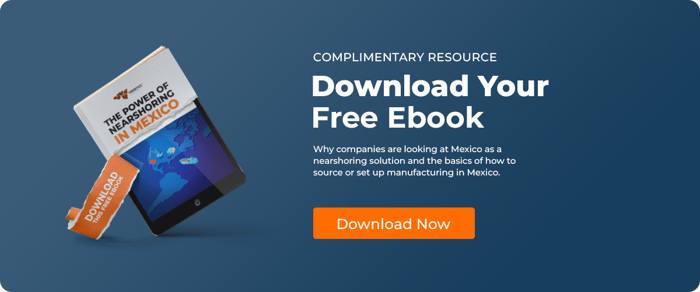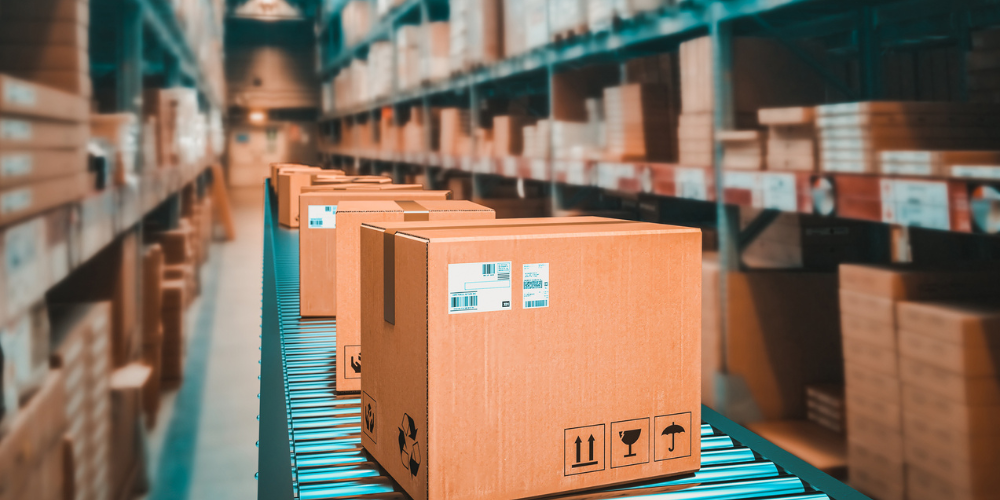For many American and foreign companies, manufacturing products in Mexico can be an attractive option. With its proximity to the United States and favorable business climate, Mexico has become a hub for international trade, offering a wealth of opportunities for businesses looking to expand their operations. However, finding reputable Mexican suppliers can be a daunting task, especially for those unfamiliar with the market.
In this article, we will provide you with a step-by-step guide on how to find reliable manufacturers in Mexico, from conducting online research to meeting with Mexican representatives in person. We will also offer tips on how to identify trustworthy manufacturing companies in Mexico, and discuss the potential risks and challenges that businesses may face when sourcing suppliers in Mexico.
Why Manufacture in Mexico
Mexico's manufacturing industry offers numerous benefits for companies looking to grow their business. The country's lower-cost labor force and competitive wages offer a significant cost advantage to companies. Additionally, Mexico's manufacturing economies are becoming more sophisticated, providing businesses with access to modern facilities and well-established supply chain networks. These factors, along with the country's young and skilled workforce, make it an attractive option for businesses looking to expand their manufacturing capabilities.
Mexico's diversification of the market is another advantage. The country provides easy access to a range of markets and customers, making it a desirable option for businesses looking to diversify their customer base. Moreover, Mexico's proximity to the United States is a crucial factor, allowing businesses to reduce transportation costs and lead times. These factors provide a compelling reason for businesses to consider manufacturing in Mexico as a way to expand their production capabilities and take advantage of the many benefits the country has to offer.
If you are interested in learning more about why businesses are moving to Mexico to manufacture their goods, check out our blog titled "Mexico Disrupts Chinese Manufacturing". The post discusses the benefits of relocating manufacturing operations from China to Mexico, as well as the current state of the manufacturing industry in Mexico. You'll gain valuable insights into the reasons why many companies are making the move to Mexico and how this shift is impacting the global manufacturing landscape.
Products Manufactured in Mexico
Mexico has a diverse and thriving manufacturing industry that spans across various sectors, catering to both domestic and international markets. The country is known for its production of a wide range of products, including electronics, automotive parts, medical devices, aerospace components, and household appliances. These industries play a crucial role in Mexico's economy, contributing significantly to its overall profitability.
In addition to these sectors, Mexico also boasts a strong presence in the food and beverage industry. The country is a major producer of popular beverages such as beer and tequila, as well as processed foods including juices and nectars, sauces, canned fruits, canned legumes, seafood products, cereals, and a range of traditional Mexican specialties such as moles, hot sauces, guacamole, and avocado cubes. Furthermore, Mexico has a growing textile and apparel industry, manufacturing clothing, accessories, and footwear that are exported worldwide.
Aside from these notable industries, Mexico is home to other thriving sectors, including construction materials, chemicals, plastics, and metalworking. These industries contribute to the overall economic growth of the country and provide employment opportunities for its citizens. Mexico's manufacturing industry is highly diversified, allowing it to meet the diverse needs of various industries and markets.
Among the diverse manufacturing landscape in Mexico, industries such as pharmaceuticals, technology hardware, aerospace & defense, and automotive manufacturing are considered to be highly profitable. These sectors not only contribute significantly to the country's economy but also attract substantial investment and generate substantial revenue.
How to Find Manufacturers in Mexico
While countries like US and China have online manufacturing search portals like Thomasnet.com and Alibaba.com, Mexico lacks such a platform. As a result, finding the right manufacturer in Mexico can be overwhelming. Finding Shelter companies in Mexico can be fairly easy with a quick online search but building out Supply Chains in Mexico can be much more difficult.
Because of this, many businesses opt to work with a Mexico sourcing consultant who can provide street-smart sourcing to ensure the best price and quality in Mexico. A consultant can help you find reliable manufacturers and even help relocate your American or foreign company to establish a new source company in Mexico.
Talking to Suppliers in Mexico
When sourcing suppliers in Mexico, here are some key things to keep in mind:
- Check the company website: Unlike in the US, Mexican businesses typically don't allocate significant resources to their supplier websites. A supplier's website may not reflect their capabilities accurately, and some businesses may not even have a website.
- Verify capabilities: When asked if they can fulfill a request, suppliers in Mexico typically answer "yes," even if the request may be beyond their capabilities. It's essential to explore a supplier in person and check their facilities to ensure they have the necessary capabilities.
- Use phone calls: In Mexico, email is typically considered a complementary process, while face-to-face meetings and phone calls are more standard. It's crucial to pick up the phone and call the company when sourcing a supplier.
- Visit in person: For senior executives, visiting manufacturing locations in person is essential, especially during the negotiation process. This can help build trust between trading partners and establish strong relationships, which are highly valued in Mexican culture.
Keep in mind that finding the right supplier in Mexico may take time and effort, but by exploring the above solutions, you can be sure that you are partnering with a reputable and reliable business that can meet your specific needs.
Challenges Sourcing in Mexico
Beginning the process of sourcing suppliers in Mexico can be challenging, as businesses may face language barriers and cultural differences. These challenges can make it difficult for businesses to identify the right suppliers and ensure that their products meet the necessary quality standards. It's essential for businesses to conduct thorough research and due diligence, including on-site visits and audits, to mitigate these risks and ensure that they are partnering with reputable and reliable suppliers. Also, the process takes time. Mexico is unlike China where you can attend a trade show and place a PO shortly thereafter.
However, with patience and due diligence, the reward of working with a supplier in Mexico can be significant. Mexican suppliers offer competitive pricing and high-quality products, and businesses can benefit from the country's strategic location and well-established supply chains. By finding the right supplier, businesses can successfully tap into the vast potential that Mexico has to offer, paving the way for long-term success and growth.
The Importance of Comparing Total Landed Costs
When choosing between manufacturing in Mexico and China, comparing total landed costs is essential for businesses aiming to enhance their supply chain efficiency and cost-effectiveness. This comprehensive analysis goes beyond initial manufacturing expenses to include tariffs, shipping costs, and lead times that impact the overall expense of importing goods from these countries. China has traditionally been favored for its expansive manufacturing capabilities and traditionally low labor costs.
However, Mexico presents several advantages, such as proximity to the U.S. market, which can significantly reduce shipping times and costs, as well as favorable tariff conditions under trade agreements like the USMCA. By thoroughly assessing the total landed costs, companies can make well-informed decisions that not only minimize expenses but also mitigate risks and improve supply chain resilience. This strategic approach enables businesses to leverage the unique benefits of each country, ultimately achieving a competitive advantage in the global marketplace by selecting the most efficient and cost-effective manufacturing location.
Mexico US Cross Border Logistics
Mexico's proximity to the US provides significant advantages for businesses, particularly when it comes to cross-border logistics. Shipping products from Mexico is often a preferred option over shipping from other locations in the world due to the ease and speed of transportation. Compared to countries such as China or India, shipping from Mexico is faster, more cost-effective, and reduces the time it takes for products to reach the market.
Additionally, Mexico has free trade agreements with more than 40 countries, including the US and Canada, which facilitates the movement of goods and allows for more streamlined customs procedures. This ultimately leads to lower costs and faster delivery times, making Mexico an ideal location for businesses looking to streamline their supply chain.
Moreover, Mexico's proximity to the US means that it is easy for companies to travel back and forth to oversee production, negotiate deals, and troubleshoot any issues that may arise. This allows for more effective communication and collaboration between businesses in the US and their Mexican suppliers.
How long does it typically take to ship products across the border from Mexico to the US?
The duration of shipping products across the border from Mexico to the US typically depends on several factors. These factors include the resting times required for drivers, the chosen route for shipping, as well as the time necessary for cargo inspection. However, it is important to note that there are external elements that can cause delays in the shipping process. Some of these factors include weather conditions, holidays, and potential truck issues. Taking all these factors into account will help to provide a more accurate estimate of the typical shipping time for products crossing the border from Mexico to the US. But, when comparing to importing from Asia, Mexico takes days compared to weeks.
How expensive is cross-border shipping between Mexico and the US, and are there ways to save money?
The overall expenses incurred for cross-border shipping from Mexico to the U.S. Are influenced by a variety of key factors. These include the origin and destination points, the mode of transportation utilized, the weight of the shipment, and the specific type of product being transported. Each of these elements plays a crucial role in the final shipping costs. For instance, heavier or bulkier shipments typically incur higher transportation fees, and the nature of the product can require special handling that may increase costs.
However, despite the inherent expenses associated with cross-border shipping, there are effective strategies to manage and potentially reduce these costs. One of the most impactful is choosing the right logistics partner. Working with a logistics company that offers preferential rates based on volume and provides expert price comparisons can lead to significant savings. These companies leverage their expertise and networks to optimize shipping routes and methods, further driving down costs.
Moreover, many times the total cost per unit for shipping from Mexico is lower than from Asia. For example, when shipping from Asia, the largest ocean containers typically available to most importers is a 40' High Cube (HQ) container. From Mexico, however, 53' trailers and intermodal containers are available, allowing companies to typically get 50% more inventory on a truck versus a 40' container from Asia. This increased capacity can have a major impact on reducing the logistics costs per unit.
By understanding these factors and making informed choices about transportation methods and logistics partners, businesses can effectively manage and even reduce the costs associated with cross-border shipping from Mexico to the U.S.
What factors should be considered when choosing the right shipping service for shipping from Mexico to the US, such as cost, specificity, service level, asset or non-asset-based, and sustainability?
When selecting a shipping service for shipping from Mexico to the US, there are several key factors to consider. These factors include cost, specificity, service level, asset or non-asset-based options, and sustainability.
1. Cost: It is essential to choose a shipping service that aligns with your business budget. However, it is not solely about the overall cost. You should also consider the quality of service and delivery time offered by the shipping service. This will depend on your company's desired turnaround time and efficiency standards.
2. Specificity: It is crucial to select a shipping service experienced in handling shipments from Mexico to the US. They should be well-versed in the regulations and requirements of this shipping process to ensure a smooth experience. Avoid choosing a shipping service that may be unprepared for the specific requirements you may have.
3. Service Level: Assess the level of service or LOS (Level of Service) rates offered by the shipping service. It is vital to ensure that the chosen company has a long history of reliability. This reliability will enhance your business's reputation and overall processes. Additionally, look for a shipping service that provides effective communication, keeping you updated on the status of your shipment.
4. Asset or Non-Asset-Based: Consider whether you prefer an asset-based or non-asset-based shipping company. An asset-based company provides all the necessary materials for transport, streamlining the process. Conversely, a non-asset-based company involves more individuals in the shipping process, which increases the possibility of errors. If you aim to minimize errors, an asset-based company is typically the more appropriate choice.
5. Sustainability: It may be of interest to find a shipping company that aligns with your business's sustainability goals. If reducing your company's carbon footprint is important, search for shipping companies that offer eco-friendly solutions. These companies often have environmental commitments in place that match your sustainability objectives. Note that opting for an environmentally conscientious company may result in additional costs.
Considering these factors, you can make a well-informed decision when choosing the right shipping service for shipping from Mexico to the US. If you're interested in learning more about cross-border logistics and how it can benefit your business, check out our blog post titled "Optimizing Your Global Supply Chain with Cross Border Logistics." In this article, we explore the advantages of using cross-border logistics, including reduced transit times, lower costs, and increased flexibility.
Are there any restrictions on importing and exporting to and from Mexico?
Yes, there are restrictions on importing and exporting goods to and from Mexico. These restrictions need to be taken into account, especially if you have plans to manufacture products in Mexico that you intend to sell in the United States. It is important to be aware of the specific regulations and requirements enforced by both countries to ensure compliance and to avoid any potential issues or delays in your import and export process.
What documents are required for importing from Mexico to the US?
The necessary documents for importing goods from Mexico to the US include an import form, a commercial invoice, a bill of lading, and a NAFTA Certificate of Origin. Please note that the NAFTA Certificate of Origin is only applicable to goods that meet the requirements for NAFTA qualification. Additionally, all goods imported and exported from Mexico require a Mexican Customs broker and a Pedimento to be filed to for customs in Mexico.
Business Consulting Services In Mexico
Looking to establish manufacturing in Mexico or ship products to the US? The process can be complex - from finding the right suppliers to navigating cross-border logistics. That's where Visigistics comes in. Our team of experienced business consultants can help guide you through every step of the process, ensuring that you have a smooth and successful experience. From sourcing the right manufacturers to managing the logistics of shipping, we have the knowledge and expertise to help you succeed. So if you're interested in taking advantage of the benefits of manufacturing in Mexico, or if you need help shipping your products to the US, talk to one of our team members at Visigistics today.
If you are not ready to talk to someone yet, feel free to download our eBook The Power of Nearshoring in Mexico.
Q: Which companies moved to Mexico from the US in 2021 and established new assembly plants there?
Several prominent companies shifted their operations to Mexico from the US and set up new assembly plants in 2021. Among them are BMW, Nissan, Honda, Ford, Audi, Daimler, Mazda, and Toyota. This significant growth in the automotive industry has not only brought these companies to Mexico but has also attracted over 500 new automobile suppliers from the US and various other locations in the past five years.
Q: What are some of the top electronics contract manufacturing companies in Mexico?
In Mexico, there are several prominent electronics contract manufacturing companies that have established a strong presence in the industry. Some of the top companies include Bollore Logistics Mexico, IDW Innovation Studio, MAPEI de Mexico SA de CV, SANYO SPECIAL STEEL Co., Ltd, Lyndex-Nikken Mexico, Irritec S.p.A., Roller Die + Forming, Daws Manufacturing Company, Inc., PLASTEK DE MEXICO, The Gund Company, Yachiyo Mexico Manufacturing, and JD Norman SLP. These companies are known for their quality services, advanced technology, and expertise in the field of electronics manufacturing.
Q: What types of clothing products are manufactured by clothing companies in Mexico?
Clothing manufacturing companies in Mexico are responsible for producing a wide variety of apparel and garments. Some of the products manufactured by these clothing companies in Mexico include T-shirts, sweatshirts, swimsuits, and other categories of outfits. The list of clothing products made by manufacturers in Mexico is extensive and diverse, showcasing the range of items produced by the country's clothing industry.
Q: What types of medical devices are manufactured in Tijuana and Baja, California?
In Tijuana and Baja, California, a wide range of medical devices are manufactured, including but not limited to dentures, electronic thermometers, hemodialysis components, infusion pumps, IV administration sets, surgical kits and equipment, urinary catheters, wheelchairs, X-ray film marking systems, lenses, medical supplies, nebulizers, orthopedic braces, oximeters, pacemakers, single-use medical supplies, and stents. These devices cater to various medical needs, from life-saving to life-enhancing purposes. The region boasts a high concentration of skilled employees dedicated to the production of these essential medical tools.
Q: Which companies are included in the list of automobile manufacturers in Mexico?
The list of automobile manufacturers in Mexico comprises the following prominent companies:
- Toyota
- Volkswagen Group
- Daimler
- BMW
- Ford Motors
- Honda Motors
- General Motors
- Hyundai Motors
- Nissan Motors
- SAIC Motors
Q: Which are the top 10 textiles & apparel manufacturing companies in Mexico?
According to our research, the top 10 textiles & apparel manufacturing companies in Mexico based on revenue for March 2022 are as follows:
1. Vertical Knits
2. Distribuidora Flexi, S.A. De C.V
3. Grupo Industrial Miro, S.A. de C.V
4. Lavartex 5. Calzado Duramax
6. Grupo Piagui
7. Lactoproductos La Loma, S.A. de C.V
8. Rio Sul S.A. de C.V
9. Liz Minelli
10. Hammock Boutique
Q: What steps should be taken to ensure compliance with importation laws when shipping goods between Mexico and the United States?
To ensure compliance with importation laws when shipping goods between Mexico and the United States, it is crucial to stay informed about the evolving regulations in both countries. Collaborating with an import/export specialist for cross border logistics who possesses knowledge of the current laws in Mexico and the United States is essential. By seeking expertise from professionals familiar with international trade regulations, you can guarantee that your importation policies align with national laws and minimize the risk of any legal complications. Establishing a partnership with an international expert can also aid in streamlining the import process, enhancing the efficiency of delivering goods across borders.
Q: How does Mexico rank in terms of exporting medical devices globally?
Mexico is ranked as the eleventh largest exporter of medical devices globally, according to the Observatory of Economic Complexity (OEC). In 2019, Mexico exported nearly $11.7 billion worth of medical devices, making it the leading exporter in Latin America and a significant supplier to the United States.
Q: How much merchandise is annually exported from Mexico and what percentage of it goes to the United States?
On a yearly basis, Mexico exportsover 400 billion dollars' worth of merchandise. A significant portion, approximately 80%, is directly sent to the United States. This close economic relationship highlights the high volume of trade between Mexico and the United States.
In fact, for the first 11 months of 2023, Mexico exported almost $440B dollars in goods to the United States.
Q: What are the most common products imported from Mexico?
The most common products imported from Mexico include vehicles, auto parts and equipment, electronics and appliances, crude petroleum, medical instruments, beer, plastic items, gems and precious metals, vegetables, and fruits and nuts.
Q: What are some key factors that make Mexico an attractive location for manufacturing plants?
Mexico offers several compelling advantages for setting up manufacturing plants, particularly when it comes to its relationship with the United States. Firstly, the cost of production, including labor, is significantly lower in Mexico compared to North America, yet the workforce maintains a comparable level of quality and expertise. Additionally, the strategic geographical positioning of Mexican border cities like Tijuana provides an optimal setting for large manufacturing operations. These locations benefit from reduced logistical challenges such as shorter shipping times, minimal language barriers, and little to no time zone differences. These factors combine to make Mexico a highly desirable destination for manufacturing within close proximity to the U.S. market.
Q: How has Mexico become a prime destination for manufacturing compared to other countries?
Mexico has emerged as a leading destination for manufacturing due to several key factors that distinguish it from other countries. Firstly, the cost of production in Mexico, including labor costs, is significantly lower than in many other regions, yet it maintains a level of quality and efficiency comparable to that of North American standards. Additionally, the strategic geographical location of Mexican border cities, like Tijuana, offers optimal conditions for setting up large-scale manufacturing facilities. These locations provide critical advantages such as reduced shipping times and costs, minimal language barriers, and alignment with North American time zones, making coordination simpler and more cost-effective. These logistical and economic benefits have established Mexico as a preferred location for manufacturing, making it an attractive alternative to traditional Asian manufacturing hubs.
Q: What industries are represented by US companies manufacturing in Mexico?
American corporations operate across multiple sectors within Mexico, encompassing areas such as the production of medical devices, electronics, aerospace components, and automobiles. Notable examples include Medtronic, which is involved in the medical devices industry, Samsung participating in the electronics sector, Honeywell focusing on aerospace manufacturing, and General Motors engaged in the automotive industry. These companies illustrate the diverse manufacturing activities of US businesses in Mexico.
Q: What are the success stories of US companies manufacturing in Mexico, specifically in Tijuana?
In Tijuana, a variety of U.S.-based firms have demonstrated significant success and growth, capitalizing on the strategic advantages offered by this border city. Notable examples include Medtronic, which has excelled in the production of medical devices, showcasing a robust operational setup. Similarly, Samsung, although originally a South Korean company, operates its electronics manufacturing under the aegis of its U.S. branch, making significant strides in the local market. In the aerospace sector, Honeywell has developed a solid manufacturing presence, contributing extensively to the industry's local and international supply chain dynamics. Additionally, General Motors stands out in the automotive industry, operating a substantial manufacturing facility that supports both local employment and broader economic activity in the region. These cases reflect how Tijuana has become a crucial hub for manufacturing excellence, driven by the contributions of these American enterprises.
Q: Which US companies have manufacturing operations in Mexico?
Several prominent U.S. companies operate manufacturing facilities in Mexico across various industries, enjoying the benefits of its strategic geographic location and skilled workforce. In the medical devices sector, Medtronic stands out with its extensive operations. Established in the 1970s, Medtronic has expanded to include six plants, notably a significant facility in Tijuana, employing over 10,000 locals to produce medical devices such as heart valves, catheters, pacemakers, and more.
In the realm of electronics, a leading global technology company operates a substantial TV assembly plant in Tijuana. This facility is responsible for producing approximately 19 million television units annually, which are distributed across the continent.
The aerospace industry in Mexico also features key players like Honeywell, which has been active in Mexico since the 1930s. This longstanding presence underscores the country's role as a critical hub in aerospace manufacturing.
The automotive sector has seen considerable growth, with General Motors as a major participant. Since establishing its presence in the 1960s, General Motors has significantly ramped up its operations and, as of 2018, was recognized as the largest automotive producer in Mexico, with production numbers exceeding 80,000 vehicles.
These examples highlight how Mexico plays a crucial role in the manufacturing operations of various leading U.S. companies across different sectors.
Q: What US companies manufacture in Mexico and why do they choose Mexico for production plants?
Many American companies establish their manufacturing operations in Mexico, drawn by its numerous competitive advantages. The close trade ties between the US and Mexico enhance this relationship, making Mexico a preferred choice for US manufacturers. One of the main reasons is the reduced production and labor costs found in Mexico, which are significantly lower than in the US while maintaining comparable standards of quality and workforce skills. Additionally, the strategic location of Mexican border cities like Tijuana provides logistical benefits. These cities offer vast spaces suitable for large industrial setups and minimize the logistical challenges typically associated with overseas production, such as extended shipping times and language barriers. The proximity to the US ensures shorter lead times and reduces transportation costs while operating within a similar time zone, making communication more efficient. These factors, alongside Mexico’s proven track record as a successful manufacturing hub, make it an attractive destination for US companies seeking to optimize production and increase profitability.
Q: Which major music instrument brands have chosen Baja for manufacturing?
Major music instrument brands including Taylor Guitars, Gibson, and Fender have selected Baja California as a location for their manufacturing operations.
Q: What are some regulations that impact manufacturing in Mexico?
In Mexico, manufacturers face a range of government regulations that significantly influence their operations. As in many federal systems, although there is regional autonomy, the national government exerts considerable control over legislative matters, more so than in the United States. Mexican law predominantly relies on codified regulations across various domains.
Key areas of regulation affecting manufacturing include health and safety standards, labor laws, and environmental protections. Here's a more detailed look at some of these regulations:
1. **Environmental Regulations**:
- **Waste Management**: Regulations require that manufacturers must not transport, store, or dispose of waste without proper permits. While manufacturing by-products generated on-site do not necessitate individual permits, the facilities used for storing such waste must comply with national standards.
- **Air Quality Controls**: Manufacturing facilities are subject to strict air pollution controls and must possess the appropriate permits for emissions. All potential pollution sources are regulated under federal law, emphasizing the importance of compliance with these rules.
- **Water Quality Oversight**: The National Water Commission (Comisión Nacional del Agua or CNA) enforces regulations pertaining to water pollution. Manufacturers must obtain necessary permits and authorizations to address any potential water pollution issues, and failure to comply can result in substantial financial penalties.
2. **Trade Regulations**:
- Restrictions also exist concerning the import and export of goods to and from Mexico. Compliance with these rules is crucial for businesses planning to manufacture products within Mexico with the intention of selling them domestically or internationally, particularly in markets like the United States.
Understanding and adhering to these regulations is essential for manufacturers in Mexico to operate legally and sustainably.
Q: What are some key states in Central Mexico known for their manufacturing industries?
Several states in Central Mexico stand out as key hubs for manufacturing industries, each with its specialization. Known for its robust participation in the automotive, electronics, and aerospace sectors, Queretaro not only houses these industries but also focuses on developing a skilled workforce for aerospace. Meanwhile, Guanajuato leverages its strategic location to serve a vast market, predominantly focusing on automotive along with textile and chemical production. San Luis Potosi, with its impressive expansion over the last three decades, features 17 industrial parks and dedicates a quarter of its GDP to manufacturing. Aguascalientes is a significant player in the automotive and metal mechanics industries, contributing 35% to its state GDP and hosting major companies like Nissan, Honda, Mazda, and GM. These states exemplify the diverse and dynamic nature of Central Mexico's manufacturing sector.
Q: What are some of the best places to manufacture in Mexico?
Mexico offers several prime locations for manufacturing across various states, each known for specific industries and key international companies. Here's a breakdown of some of the top areas:
1. **Mexicali**: As the capital of Baja California, situated right at the border with California, Mexicali is a strategic location for manufacturing, hosting major companies like Kenworth Paccar and UTC Aerospace Systems.
2. **Tijuana**: Known as a dynamic financial and industrial city with a rapidly growing population, Tijuana is an important manufacturing hub for companies like SC Johnson and Flextronics.
3. **Tecate**: This city, also in Baja California, supports over a hundred manufacturing operations, attracting global brands such as Teleflex Medical and Taylor Guitars.
4. **Ensenada**: Located just 78 miles from San Diego, Ensenada serves as a vital commercial port and manufacturing center, with facilities for companies such as Fender Guitars and ICU Medical.
5. **Hermosillo**: In the state of Sonora, Hermosillo stands out for its robust manufacturing sector, home to large plants from Ford and Bosch. The city benefits from housing a significant portion of the state’s population.
6. **San Luis Rio Colorado**: Positioned in Sonora, this city excels in various sectors including textiles, metal mechanics, and electronics. Notable manufacturers include Masimo and TSE Brakes. These locations highlight Mexico's diverse manufacturing landscape, offering opportunities in a wide range of industries from automotive to electronics and beyond.
Q: How can one contact companies in Mexico to determine their manufacturing capabilities?
To determine the manufacturing capabilities of companies in Mexico, start by searching for businesses via platforms like Google Business, which lists companies by location and type. After identifying potential companies, visit their websites to evaluate if their manufacturing services meet your criteria. If a company aligns with your needs, use the contact information on their website to reach out directly. Repeat this process with multiple companies to compare and find the one that offers the best quality in their manufacturing. Or, to shorten the process, contact us to have a call about your manufacturing needs.
Q: What are the benefits of manufacturing in Mexico?
Manufacturing in Mexico offers a host of advantages that significantly benefit businesses. One of the primary benefits is the cost-effectiveness of operations. Labor costs in Mexico are considerably lower than in the United States—up to 80% less—without compromising on the skill level of the workforce. Furthermore, the real estate costs in major Mexican cities are roughly half those in the U.S., reducing overall operational expenses.
Mexico's strategic geographic location also enhances its appeal as a manufacturing hub. It provides easy and cost-effective export options thanks to its robust infrastructure and its membership in the North American Free Trade Agreement (NAFTA), which facilitates smoother trade across North America.
The workforce in Mexico is another major asset for manufacturers. The country enjoys a youthful labor force, with a median age of 26 years, compared to 37 in the United States. This younger workforce is not only large, exceeding 47 million, but also highly educated. Each year, Mexico graduates around 115,000 engineers, ensuring a steady supply of skilled professionals.
Additionally, Mexico offers a diverse and growing market that businesses can tap into. The business climate is welcoming, fostered by cultural and linguistic similarities with other North American countries, making it an attractive environment for starting and running manufacturing operations.
Q: How does cross-border shipping from Mexico to the U.S. Work?
To facilitate cross-border shipping from Mexico to the United States, there are several steps and required documentation. Initially, a carrier in Mexico is responsible for transporting the goods to a border city. At this point, a Mexican customs broker processes the export paperwork (called a Pedimento), ensuring that the goods can leave Mexico legally. Subsequently, upon reaching the U.S. border, a U.S. customs broker must take over and handle the customs clearance forms, enabling the goods to legally enter the United States.
After clearance, a border drayage company usually takes over to move the products across the border. From there depending on the carrier's capability, the trailer is moved to a secured yard where a driver with authorization to deliver in the US picks up the goods or the product is taken to a cross dock facility at the border. Once the product is picked up, a U.S.-based driver will manage the final delivery to the ultimate recipient.
Essential documents needed for this process include an import form, a commercial invoice, and a bill of lading. If the goods qualify for the North American Free Trade Agreement (NAFTA), a NAFTA Certificate of Origin will also be required. These documents play crucial roles in the legal and smooth transition of goods across the border.
Q: What are some specific portals for finding businesses to partner with in Mexico?
Visigistics has not found any good portals that we recommend due to the fact that many Mexican companies do not do a good job of marketing. So. there are many very good manufacturing companies without any marketing presence online.
Q: How can one locate manufacturers in Mexico through online directories?
Visigistics has not found any good online directories that we recommend due to the fact that many Mexican companies do not do a good job of marketing. So. there are many very good manufacturing companies without any marketing presence online.







